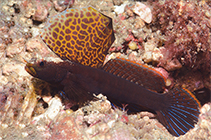| Family: |
Gobiidae (Gobies), subfamily: Gobiinae |
| Max. size: |
3.24 cm SL (male/unsexed); 4.37 cm SL (female) |
| Environment: |
demersal; marine; depth range 17 - 23 m |
| Distribution: |
Western Pacific: Indonesia, North Sulawesi Province. |
| Diagnosis: |
Dorsal spines (total): 7-7; Dorsal soft rays (total): 10-10; Anal spines: 1-1; Anal soft rays: 10-10; Vertebrae: 26-26. This species is distinguished by the following characters: first dorsal fin enlarged and sail-like, no filamentous rays; dorsal fin bases are confluent; segmented dorsal-fin and anal-fin rays 10; pectoral-fin rays 15-17; caudal fin ovate, longer than head length, 2.5-3.0 in SL; gill opening extending forward to the level of middle of opercle; anterior nostril is sheathed in elongate, partially enclosed tube; scales are entirely cycloid, lateral scales 66-72, transverse scales 19-21; cephalic sensory-canal system including pores B’, C, D, E, F, G, M’, and O’. Body colour overall is brown with 10 or 11 poorly contrasted, darker-brown bars on lateral body; a dense patch of small white spots on dorsal surface of head; first dorsal fin orange or blue-grey with a mosaic of irregular, dark brown markings, while second dorsal fin is yellowish to brown with blue bands or rows of dark brown spots; anal, caudal, and pelvic fins dark brown with blue streaks (Ref. 121269). |
| Biology: |
The collection area is exposed to periodic strong currents and cool upwelled water with sea temperatures of 23-25°C at the time of collection in August 2019 . The specimens were observed on gradually sloping, sand-rubble bottoms, in pairs or solitary, in shared burrows with the brightly colored alpheid shrimp Alpheus randalli (Ref. 121269). |
| IUCN Red List Status: |
Least Concern (LC); Date assessed: 18 August 2023 Ref. (130435)
|
| Threat to humans: |
harmless |
Source and more info: www.fishbase.org. For personal, classroom, and other internal use only. Not for publication.
